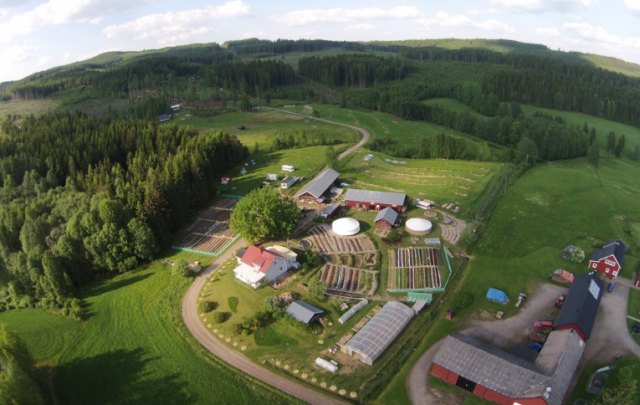 In modernity, we value progress and individualism, which are part of a constellation of values that also includes mobility, acquisition, and change. We are suspicious of social ties that may bind, even as we long for connection, for these ties limit values that are even more important to us than that. We privilege individual excellence over group cohesiveness and thus valorize the restless and dissatisfied seeker, especially when he [sic] pursues innovation. And “innovation,” in modernity, almost always refers to a way or decreasing manual labor and separating humans from nature, so that we may free ourselves from the limitations of our muscle power, of pathogenic disease, and the vicissitudes of weather. One of the hallmarks of modernity, the Faustian Era, as Oswald Spengler pointed out, is a strong sense of the infinite, and thus a world without limits.
In modernity, we value progress and individualism, which are part of a constellation of values that also includes mobility, acquisition, and change. We are suspicious of social ties that may bind, even as we long for connection, for these ties limit values that are even more important to us than that. We privilege individual excellence over group cohesiveness and thus valorize the restless and dissatisfied seeker, especially when he [sic] pursues innovation. And “innovation,” in modernity, almost always refers to a way or decreasing manual labor and separating humans from nature, so that we may free ourselves from the limitations of our muscle power, of pathogenic disease, and the vicissitudes of weather. One of the hallmarks of modernity, the Faustian Era, as Oswald Spengler pointed out, is a strong sense of the infinite, and thus a world without limits.
Because we are “moderns” through and through, it should be of little surprise that we draw on the values and concepts mentioned above, as well as a large host of related ones, when we encounter a challenge such as climate change. As inevitable as this is—at least until we are finally struck by its futility—this is unfortunate: climate change is also a distinct development of modernity and there may be no viable modernist response to it. The (futile) responses that are seen as plausible by people of power and influence, and just about everyone else, might be divided into two categories: the market and the political. Their limitations may point the way towards something more useful.
1. The Market response. The primary way in which free markets might help us solve climate change is by way of the allegedly immutable laws of supply and demand and the innovation that these laws will, if allowed to, inspire (or so the argument goes). Accordingly, innovative entrepreneurs will find substitutes for fossil fuels when they prove to be too expensive or inefficient. Unfortunately for us, however, we are a long ways from this (possibly imaginary) threshold, a point which yields two distinct responses, one of which is typical of political conservatives and one typical of political liberals. The conservative response involves great faith in the markets, to the extent that any problem that the markets cannot solve, it is believed, cannot really be a problem. The liberal response is much more rational and sane, but all the more modern in its apparent escape from conservative reductionism. The liberal market response notes that the true costs of our fossil fuels have been “externalized” and are not paid for within our current market system. These liberals will argue that the markets need to be rationalized so as to include the cost of clean-up, health-problems, and of course global climate change. When this happens, liberal marketeers believe, solar and wind will prove themselves to be far more cheap and efficient than fossil fuels, and market forces will provide the motive power for a rapid transition.
A large part of the discourse over peak oil focusses on the false underlying assumptions of the liberal belief in the capacity of rationalized markets. People like Campbell and Heinberg show that if the true costs of fossil fuels were internalized, we would not see a switch to renewables. Rather, we would see the markets collapse. The simple reason for this is that only the explosive power of fossil fuels can power the sort of endless expansion that markets need in order to thrive.
If left to themselves, the critiques of peak oil do not provide an alternative to a market-based solution, though instead of market-based solution we should probably say market based result. At any rate, even as it was always a fairly unsubstantiated hope, the prospect of peak oil led some people to believe and even hope that we would be saved from a climate disaster if not by running out of fossil fuels, because their increased expense and lower net energy might cause global markets to collapse. Although the opposite of those with faith in the market’s perfection, this position (which has not been supported by the likes of Heinberg, who never claim that peak oil would solve climate change) still relies on the dynamics of the market and believes that whatever reality we may produce will be mainly market driven.
As long as we don’t put any hope in the reality markets may yield, I would personally agree that the partial successes and ultimate failures of markets may in fact be the main force shaping the, in this case short, future of humanity.
2. The Political Response. The political response seeks to place limits on the burning of fossil fuels through international agreements, taxation, or other sorts of legislation. It often attempts to work in concert with market approaches, hoping for instance that by placing a tax on carbon emissions we might provide the same incentive that internalizing its costs would. It turns out, in fact, that any proposed legislation or agreement that does not claim it can either benefit the economy, or at least not adversely affect it, is dead on arrival. We are not at a point, yet, where an elected democratic government could credibly explain to its citizens that we are going to limit your consumption in order to save our environment.
Our collective inability to limit ourselves is usually attributed to the overwhelming power and influence of “the market” and those who are best served by it. This argument is especially appealing to political liberals, who can externalize blame through the suggestion that corporate influence-peddlers and greedy bankers are preventing us from the sort of rational self-limitation necessary to keep us from cooking ourselves alive.
While I would never underestimate the power and influence of wealthy free-marketeers, if they were suddenly to disappear, the average middle-class modern consumer would be no more the ready to accept limitations on their consumption. The reason behind this, I think, has to do with the values that I listed at the outset. The political act of placing limits our consumption would also violate all that we, as modern people, hold most dear. True and effective limits on consumption would also be limits on freedom, on mobility, perhaps even on prominent sorts of individual expression. It might require more manual labor, or at the very least no more “progress” towards continued “relief” from it, as well as all the other biological aspects of human life. In short, limits on our consumption involves the very limits that modernity has banked on eliminating.
The problem with the political solution, then, is that success in confronting the challenge of climate change would involve failure according to nearly all our other values. A successful climate policy would be seen in negative terms like sacrifice, want, absence, and loss. I do not believe a democratic society is capable of this sort of negation. The United States constitution was designed so that it would be very easy to say “yes,” and extremely difficult to say “no.” A successful “political” solution would likely involve tyranny.
A Non-Modern Alternative:
Many modern people may value their modern values more than life itself. I am not one of these people.
Although the following is itself in many ways a modern response, if responding to climate change and maintaining life on earth would require us to violate our primary values, the clear choice is to question and change these values, adopting a set that is compatible with a sustainable civilization (this is modern in that only within modernity have values been seen as contingent and thus as something we might choose).
This, of course, has been the response of movements like the Transition Movement, with its focus on community rather than ultra-individualism, of living within limits as discussed in permaculture, of reskilling so that we can learn new/old manual practices. There is a sense, then, in which, Transition and Permaculture are non- or anti-modern, and what I am adding here is merely a sharpening of some of these distinctions.
But this exercise is not purely “academic,” as people are wont to say. For by sharpening these distinctions we might start the difficult project of revaluation, according to which we parse through our entire repertoire of values and hierarchies and embark on one of the most profound revolutions in expectations in human history.
For me the most profound revaluation involves the religious or spiritual realm. Ever since embarking on graduate studies in English and Comparative Literature, I have, with tongue in cheek, referred to myself as an Evangelical Atheist, one of the most modern designations one might choose, including the aspect of self-parody it includes. I was a follower of American Pragmatism, especially as articulated by the late Richard Rorty, as well as French post-structuralism and German hermeneutics and Frankfurt School Marxism. All of these schools of thought were dedicated to the most thoroughgoing demystification of everything–of in Marx’s words, making the sacred profane.
I bring this up because the self-reflection and reversal of course that saying the following involves is significant for someone who has revelled in the profane: a successful Transition may need to start acting more like a religion. I use words like “may” intentionally. I am throwing this out there for thought and discussion. But I don’t see how either market or modern political approaches can convince humans to leave most of our remaining fossil fuels in the ground. The most plausible approach, in this late hour, may be to consider things like the soil and the earth as sacred. Creating a sacred realm of the untouchable, after all, has been one of the very few successful ways in which humans have placed limits on themselves.
Many people I know might respond by saying that the soil has been sacred all along and that they have long realized it. Perhaps. Perhaps they never suffered the modern affliction as deeply as did I and do not need to become born again soil and worm worshippers. But most people who may give lip service to the sanctity of all life only live as if this is true in a limited manner. This is not a criticism, but a recognition of the difficulty of going against the modern grain of society. What I am hazarding is a far more rigorous and complete transformation of ourselves into worshipful beings, the act of creating ceremonies and songs to praise the trees, of the great worm dance to replenish our hearts, to hold aloft the world of microbes and of sweat and toil and tears.
This transition or transformation has the advantage that even at the heights of modernity when all our churches and temples made peace with the profane, vestiges of worship remained. The antithesis of modern values–the values of place, stillness, community, tradition, and belief–may provide enough tender blessings to allow us to leave some of our modernity happily behind. There is plenitude and abundance here to be found. Our beautiful biological limits are not some entirely imaginary construct. The imperfect may be our paradise.






